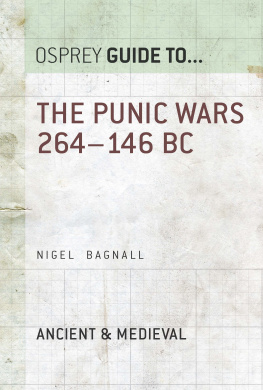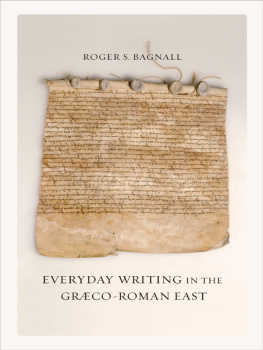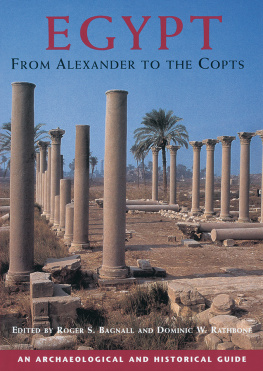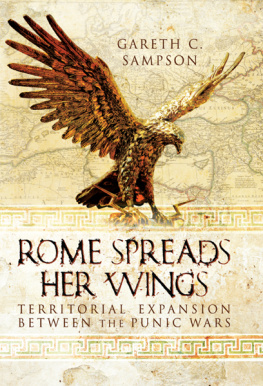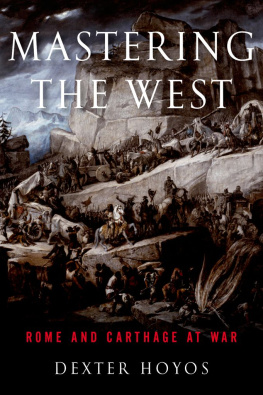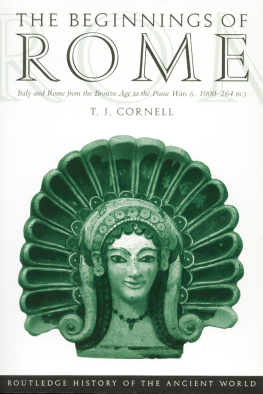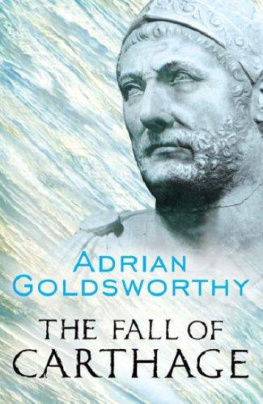Bagnall - Guide to the Punic wars, 264-146 BC
Here you can read online Bagnall - Guide to the Punic wars, 264-146 BC full text of the book (entire story) in english for free. Download pdf and epub, get meaning, cover and reviews about this ebook. City: Oxford;UK;New York;NY;USA, year: 2002, publisher: Osprey Publishing, genre: History. Description of the work, (preface) as well as reviews are available. Best literature library LitArk.com created for fans of good reading and offers a wide selection of genres:
Romance novel
Science fiction
Adventure
Detective
Science
History
Home and family
Prose
Art
Politics
Computer
Non-fiction
Religion
Business
Children
Humor
Choose a favorite category and find really read worthwhile books. Enjoy immersion in the world of imagination, feel the emotions of the characters or learn something new for yourself, make an fascinating discovery.
Guide to the Punic wars, 264-146 BC: summary, description and annotation
We offer to read an annotation, description, summary or preface (depends on what the author of the book "Guide to the Punic wars, 264-146 BC" wrote himself). If you haven't found the necessary information about the book — write in the comments, we will try to find it.
Bagnall: author's other books
Who wrote Guide to the Punic wars, 264-146 BC? Find out the surname, the name of the author of the book and a list of all author's works by series.
Guide to the Punic wars, 264-146 BC — read online for free the complete book (whole text) full work
Below is the text of the book, divided by pages. System saving the place of the last page read, allows you to conveniently read the book "Guide to the Punic wars, 264-146 BC" online for free, without having to search again every time where you left off. Put a bookmark, and you can go to the page where you finished reading at any time.
Font size:
Interval:
Bookmark:
Guide To
The Punic Wars 264-146 BC
Nigel Bagnall

There are those who would have us believe that man is a peace-loving animal, asking for no more than to be allowed to live in harmony with his fellow beings, rearing his family and pursuing his interests in contented prosperity. Such aspirations are savagely disrupted by the excesses of power-hungry despots and their brutal soldiery. The pious then regard history as little more than a tragic record of how peace is shattered by a few evil men; while military history is dismissed as a corrupting influence, glorifying war and promoting xenophobia. Yet wars have never been intermittent occurrences disrupting the natural, orderly condition of man, but rather an activity pursued with relentless consistency, sometimes with relish, and under many different guises.
As Professor Sir Michael Howard said in his David Davies Memorial Institute lecture entitled Weapons and Peace (January 1983):
The causes of war are as diverse as those of human conflict itself, but one factor common to almost all wars has been on the one side, or both, a cultural predisposition for war, whether this has been confined to ruling elites, or widespread throughout society. This is a factor which has been so often overlooked by liberal-minded historians, the existence of cultures, almost universal in the past, far from extinct in our day, in which the settling of contentious issues by armed conflict is regarded as natural, inevitable and right.
However unpalatable, the realities surrounding war should be recognised. Rather than taking refuge in wishful thinking, to avoid wars we should investigate their causes, consider how they might be prevented and prepare to defend ourselves, in itself a powerful deterrent. The study of military history then provides some perspective and enables us to learn from the lessons of the past.
The Greek historian Polybius wrote: There are only two sources from which any benefit can be derived, our own misfortunes and those which have happened to other men. Bearing these words in mind, we can turn to the three human misfortunes known as the Punic Wars which, in spite of their remoteness, possess a remarkable contemporary relevance. Two largely incompatible civilisations confronted one another in a rivalry that quickly became a to-the-death fight for supremacy. The lessons of that struggle clearly demonstrate the need for positive and consistent national policy, and the importance of co-ordinated land and naval operations; equally they highlight the consequences of failing to adapt military force structures and thinking to match circumstances, the impact of new technology (as exemplified by the corvus) and the relevance of certain battlefield principles which are common to any war.
The three Punic Wars, which lasted for more than 100 years in all, though with long periods of peace in-between, and extended throughout the Mediterranean were to decide the future of the Western world. The contest was between two races: the Indo-Germanic, which incorporated the Greeks and Romans, and the Semitic, which included the Jews and Arabs. The one side had a genius of order and legislation, the other the spirit of commercial adventure and a love of gold, blood and pleasure.
There are basically two different ways of presenting the wars that determined the course of European, if not world history: an across-the-board chronological account, or a sequential examination of the different campaigns, each in its entirety. The conventional method has been the former, but I have chosen the latter because I consider any difficulty in interrelating events occurring at the same time in different theatres to be far outweighed by the ability to follow through the development of each separate campaign. To support this approach the chronology at the end of this introduction presents the milestones of the wars and details of the events which led to Sicily becoming the principal battlefield of the First Punic War. Finally, there is a glossary of names of the principal characters.
| 814 BC | The founding of Carthage by Phoenician settlers from Tyre. |
| 800 BC | After some unknown natural catastrophe which decimated the population, Phoenician migrants return to Sicily, followed by Greeks. |
| 750 BC | The traditional date for the founding of Rome. |
| 509 BC | Treaty of friendship signed between Rome and Carthage defining trading rights. |
| 415 BC | Athenian expedition (during the Peloponnesian War) attempts to wrest Syracuse from the Spartans and cut their grain supplies from Sicily but is totally annihilated, leaving Doric Syracuse as the dominant and most prestigious city in Sicily. |
| 480 BC | Gelon of Syracuse defeats the Carthaginians at Himera and effectively removes their influence from the island for 70 years. |
| 405 BC | A resurgence of Carthaginian influence in Sicily leads to a second war with the Greek settlements, ending with the Carthaginians in possession of most of the western part of the island. |
| 380 BC | A second treaty is signed between Rome and Carthage confirming their respective trading rights. |
| 310 BC | In a third war between the Carthaginians and Greeks, Agathocles of Syracuse extends his domain in Sicily and lands in North Africa, marches on Carthage but being too weak to take the city, returns to Sicily. |
| 290 BC | Following the death of Agathocles, the Carthaginians attempt to reassert their domination but in 278 BC Pyrrhus, King of Epirus, crosses over to Sicily and secures most of the island until forced to leave through lack of support. |
| 279 BC | A third treaty is drawn up between Rome and Carthage. It confirms the earlier treaties and adds the significant clause that they would go to one anothers assistance if attacked. |
| 275 BC | The Carthaginians regain most of Sicily. |
| 264 BC | The Romans intervene in Sicily and the First Punic War begins. |
| 256 BC | Carthaginian naval supremacy is broken at the battle of Ecnomus, enabling the Romans to land in North Africa where they are heavily defeated. |
| 241 BC | A new Carthaginian fleet is destroyed, which leads to the end of the First Punic War. |
| 240 BC | Disgruntled returning Carthaginian mercenaries revolt. |
| 241 BC | The Gauls invade Italy. |
| 236 BC | The Romans respond to a request from Carthaginian mercenaries and seize Sardinia. |
| 237 BC | Hamilcar Barca begins the conquest of Spain and establishes a Barcid empire. |
| 229 BC | Hamilcar is drowned when attempting to escape across a river. He is succeeded by his son-in-law Hasdrubal. |
| 229 BC | The Romans invade Illyria. |
| 221 BC | Hasdrubal is assassinated and following the armys unanimous choice, Hannibal is confirmed by Carthage as the new commander in Spain. |
| 220 BC | Saguntum is placed under Roman protection but taken by Hannibal, the last of many incidents leading inevitably to war. |
| 218 BC | Hannibal marches from Spain, crosses the Alps and invades Italy to begin the Second Punic War. |
| 217 BC | Hannibal defeats the Romans at Lake Trasimene. |
| 216 BC | Hannibal wins an annihilating victory at Cannae and the Romans go on the defensive, avoiding any major encounter. |
| 215 BC |
Font size:
Interval:
Bookmark:
Similar books «Guide to the Punic wars, 264-146 BC»
Look at similar books to Guide to the Punic wars, 264-146 BC. We have selected literature similar in name and meaning in the hope of providing readers with more options to find new, interesting, not yet read works.
Discussion, reviews of the book Guide to the Punic wars, 264-146 BC and just readers' own opinions. Leave your comments, write what you think about the work, its meaning or the main characters. Specify what exactly you liked and what you didn't like, and why you think so.

